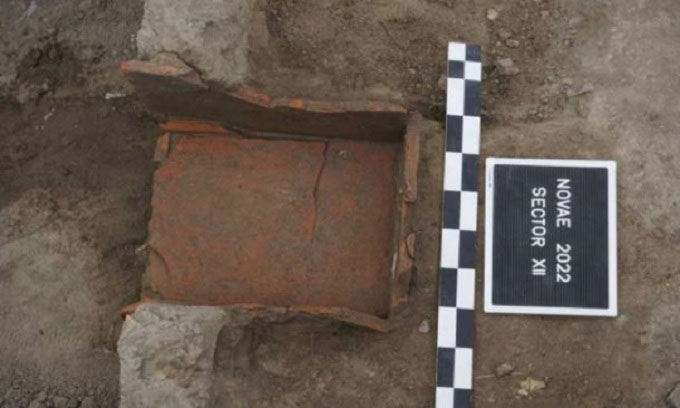The smart ceramic refrigerator used by ancient Roman soldiers to store perishable food.

Ceramic tiles used to construct the refrigerator. (Photo: PAP)
The Polish Press Agency (PAP) reported on September 29 that a team of archaeologists led by Professor Piotr Dyczek at the Center for Southeast European Antiquity at the University of Warsaw discovered a square box made from thick ceramic tiles while exploring beneath the foundations of the Novae fort of Roman soldiers in northern Bulgaria, along the Danube River. The archaeologists identified this object as an ancient version of a refrigerator, used for storing perishable food.
The Roman refrigerator was found inside the military barracks. This integrated facility was installed in a niche in the stone foundation of the building, meaning it could only be accessed from above. This design ensured that the refrigerator was always insulated by the cold stone surrounding three sides. As Bulgaria experiences temperatures below 0 degrees Celsius for up to five months a year, Roman soldiers could collect ice or snow to place inside the refrigerator, keeping food cold and fresh throughout the winter.
The research team was excited to discover that the ceramic food storage refrigerator was not empty. Inside, they found fragments of ceramic vessels along with cooked animal bones, which may be remnants of food. They also unearthed a bowl containing charcoal, used to ward off insects.
Fort Novae was built in the 1st century. It is likely that the refrigerator was also installed during that time. The smart storage design is not the only remarkable discovery made by Polish and Bulgarian archaeologists during this recent excavation. They also found dozens of Roman coins dating from the 3rd and 4th centuries.
“During this period, Novae gradually developed into a civilian city. Thanks to this latest discovery, we can gather sufficient data to reconstruct the historical phase of the ancient urban area,” Professor Dyczek shared. He also emphasized that the 1st-century refrigerator is an exceptionally rare find, as such refrigerators typically do not survive the ravages of time.


















































